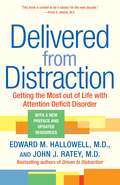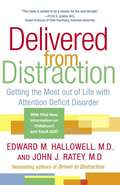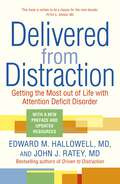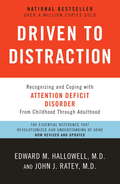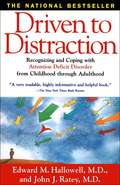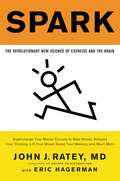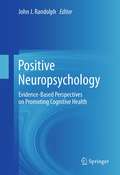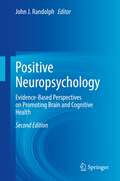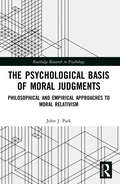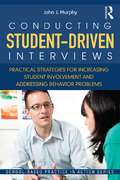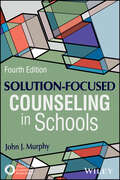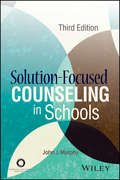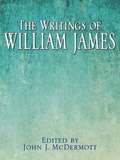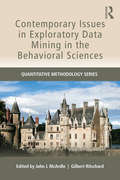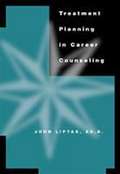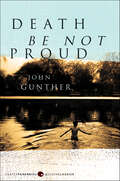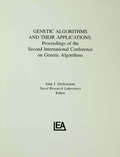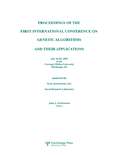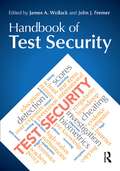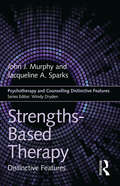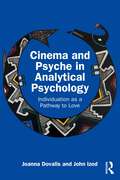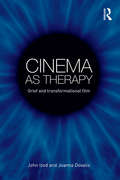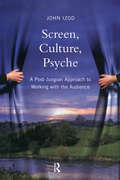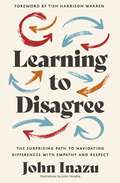- Table View
- List View
Delivered from Distraction
by Edward M. Hallowell John J. RateyIn 1994, Driven to Distraction sparked a revolution in our understanding of attention deficit disorder. Widely recognized as the classic in the field, the book has sold more than a million copies. Now a second revolution is under way in the approach to ADD, and the news is great. Drug therapies, our understanding of the role of diet and exercise, even the way we define the disorder-all are changing radically. And doctors are realizing that millions of adults suffer from this condition, though the vast majority of them remain undiagnosed and untreated. In this new book, Drs. Edward M. Hallowell and John J. Ratey build on the breakthroughs of Driven to Distraction to offer a comprehensive and entirely up-to-date guide to living a successful life with ADD. As Hallowell and Ratey point out, "attention deficit disorder" is a highly misleading description of an intriguing kind of mind. Original, charismatic, energetic, often brilliant, people with ADD have extraordinary talents and gifts embedded in their highly charged but easily distracted minds. Tailored expressly to ADD learning styles and attention spans, Delivered from Distraction provides accessible, engaging discussions of every aspect of the condition, from diagnosis to finding the proper treatment regime. Inside you'll discover* whether ADD runs in families* new diagnostic procedures, tests, and evaluations* the links between ADD and other conditions* how people with ADD can free up their inner talents and strengths* the new drugs and how they work, and why they're not for everyone* exciting advances in nonpharmaceutical therapies, including changes in diet, exercise, and lifestyle* how to adapt the classic twelve-step program to treat ADD* sexual problems associated with ADD and how to resolve them* strategies for dealing with procrastination, clutter, and chronic forgetfulness ADD is a trait, a way of living in the world. It only becomes a disorder when it impairs your life. Featuring gripping profiles of patients with ADD who have triumphed, Delivered from Distraction is a wise, loving guide to releasing the positive energy that all people with ADD hold inside. If you have ADD or care about someone who does, this is the book you must read. From the Hardcover edition.
Delivered from Distraction: Getting the Most Out of Life with Attention Deficit Disorder
by Edward M. Hallowell John J. RateyIn 1994, "Driven to Distraction" sparked a revolution in our understanding of attention deficit disorder. Widely recognized as the classic in the field, the book has sold more than a million copies. Now a second revolution is under way in the approach to ADD, and the news is great. Drug therapies, our understanding of the role of diet and exercise, even the way we define the disorder -- all are changing radically. And doctors are realizing that millions of adults suffer from this condition, though the vast majority of them remain undiagnosed and untreated. In this new book, Drs. Edward M. Hallowell and John J. Ratey build on the breakthroughs of "Driven to Distraction" to offer a comprehensive and entirely up-to-date guide to living a successful life with ADD. As Hallowell and Ratey point out, "attention deficit disorder" is a highly misleading description of an intriguing kind of mind. Tailored expressly to ADD learning styles and attention spans, "Delivered from Distraction" provides accessible, engaging discussions of every aspect of the condition, from diagnosis to finding the proper treatment regime. Inside you'll discover whether ADD runs in families new diagnostic procedures, tests, and evaluations the links between ADD and other conditions, how people with ADD can free up their inner talents and strengths. ADD is a trait, a way of living in the world. It only becomes a disorder when it impairs your life. "Delivered from Distraction" is a wise, loving guide to releasing the positive energy that all people with ADD hold inside. If you have ADD or care about someone who does, this is the book you must read.
Delivered from Distraction: Getting the Most out of Life with Attention Deficit Disorder
by Edward M. Hallowell John J. Ratey'If you read only one book about attention deficit disorder, it should be Delivered from Distraction.' Michael Thompson, Ph.D., New York Times bestselling co-author of Raising CainIn 1994, Driven to Distraction sparked a revolution in our understanding of attention deficit disorder. Widely recognized as the classic in the field, the book has sold more than a million copies. Now a second revolution is under way in the approach to ADD, and the news is great. Drug therapies, our understanding of the role of diet and exercise, even the way we define the disorder - all are changing radically. And doctors are realizing that millions of adults suffer from this condition, though the vast majority of them remain undiagnosed and untreated. In this new book, Drs Edward M. Hallowell and John J. Ratey build on the breakthroughs of Driven to Distraction to offer a comprehensive and entirely up-to-date guide to living a successful life with ADD.As Hallowell and Ratey point out, 'attention deficit disorder' is a highly misleading description of an intriguing kind of mind. Original, charismatic, energetic, often brilliant, people with ADD have extraordinary talents and gifts embedded in their highly charged but easily distracted minds. Tailored expressly to ADD learning styles and attention spans, Delivered from Distraction provides accessible, engaging discussions of every aspect of the condition, from diagnosis to finding the proper treatment regime. Inside you'll discover:- whether ADD runs in families- new diagnostic procedures, tests, and evaluations- the links between ADD and other conditions- how people with ADD can free up their inner talents and strengths- the new drugs and how they work, and why they're not for everyone- exciting advances in nonpharmaceutical therapies, including changes in diet, exercise, and lifestyle- how to adapt the classic twelve-step program to treat ADD- sexual problems associated with ADD and how to resolve them- strategies for dealing with procrastination, clutter, and chronic forgetfulnessADD is a trait, a way of living in the world. It only becomes a disorder when it impairs your life. Featuring gripping profiles of patients with ADD who have triumphed, Delivered from Distraction is a wise, loving guide to releasing the positive energy that all people with ADD hold inside. If you have ADD or care about someone who does, this is the book you must read.
Driven to Distraction (Revised): Recognizing and Coping with Attention Deficit Disorder
by Edward M. Hallowell John J. RateyGroundbreaking and comprehensive, Driven to Distraction has been a lifeline to the approximately eighteen million Americans who are thought to have ADHD. Now the bestselling book is revised and updated with current medical information for a new generation searching for answers. Through vivid stories and case histories of patients—both adults and children—Hallowell and Ratey explore the varied forms ADHD takes, from hyperactivity to daydreaming. They dispel common myths, offer helpful coping tools, and give a thorough accounting of all treatment options as well as tips for dealing with a diagnosed child, partner, or family member. But most importantly, they focus on the positives that can come with this &“disorder&”—including high energy, intuitiveness, creativity, and enthusiasm.
Driven to Distraction: Recognizing and Coping with Attention Deficit Disorder from Childhood through Adulthood
by Edward M. Hallowell John J. RateyThrough vivid stories of the experiences of their patients (both adults and children), Drs. Hallowell and Ratey show the varied forms ADD takes and the transforming impact of precise diagnosis and treatment.
Spark: The Revolutionary New Science of Exercise and the Brain
by John J. Ratey Eric HagermanA groundbreaking and fascinating investigation into the transformative effects of exercise on the brain, from the bestselling author and renowned psychiatrist John J. Ratey, MD. Did you know you can beat stress, lift your mood, fight memory loss, sharpen your intellect, and function better than ever simply by elevating your heart rate and breaking a sweat? The evidence is incontrovertible: Aerobic exercise physically remodels our brains for peak performance. In SPARK, John J. Ratey, M.D., embarks upon a fascinating and entertaining journey through the mind-body connection, presenting startling research to prove that exercise is truly our best defense against everything from depression to ADD to addiction to aggression to menopause to Alzheimer's. Filled with amazing case studies (such as the revolutionary fitness program in Naperville, Illinois, which has put this school district of 19,000 kids first in the world of science test scores), SPARK is the first book to explore comprehensively the connection between exercise and the brain. It will change forever the way you think about your morning run---or, for that matter, simply the way you think
Positive Neuropsychology
by John J. RandolphPsychology and many of its subfields have seen a significant shift over the past 10-12 years toward a focus on hope, positive attributes, and character strengths through the positive psychology movement. This book provides a blueprint for a burgeoning subfield in neuropsychology--positive neuropsychology. It proposes an alternative, evidence-based perspective on neuropsychology that incorporates positive psychology principles and a focus on promotion of cognitive health. It synthesizes existing research and provides novel perspectives on promotion of cognitive health in clinical, nonclinical, and academic settings. This work is a resource and reference for neuropsychologists, allied professionals, and students who see the critical role neuropsychologists can play in maintaining, promoting, and being mindful of cognitive health. TARGETED MARKET SEGMENTS Neuropsychologists, health psychologists, geriatricians, rehabilitation specialists, clinical psychologists
Positive Neuropsychology: Evidence-Based Perspectives on Promoting Brain and Cognitive Health
by John J. RandolphPositive psychology—the study and promotion of character strengths, positive emotion, optimism, and resilience—has gained considerable momentum and support over the last 20 years. More recently, neuropsychology has begun to embrace related perspectives. In the first edition of Positive Neuropsychology, an extensive collection of perspectives from national leaders in neuropsychology clarified the importance of promoting cognitive health through various means. The present edition expands on the first edition, with four new chapters and updates of all previous chapters. Topics include the importance of physical, social, and intellectual engagement across the lifespan; nutrition and brain health; novel technologies used to maintain brain health and functional independence; compensating for and preventing cognitive limitations; and strategies to promote brain health in clinical and other settings. Chapters reveal not only the benefits of understanding cognitive health and optimal outcomes across the lifespan, but also emerging avenues for practitioners to expand their work into non-traditional settings. Bringing new dimensions to the neuroscience, wellness, and positive psychology literatures, Positive Neuropsychology will interest a wide range of academics and clinicians, including neuropsychologists, clinical and health psychologists, geriatricians, primary care physicians, cognitive neuroscientists, and other healthcare professionals.
The Psychological Basis of Moral Judgments: Philosophical and Empirical Approaches to Moral Relativism (Routledge Research in Psychology)
by John J. ParkThis volume examines the psychological basis of moral judgments and asks what theories of concepts apply to moral concepts. By combining philosophical reasoning and empirical insights from the fields of moral psychology, cognitive science, evolutionary psychology, and neuroscience, it considers what mental states not only influence, but also constitute our moral concepts and judgments. On this basis, Park proposes a novel pluralistic theory of moral concepts which includes three different cognitive structures and emotions. Thus, our moral judgments are shown to be a hybrid that express both cognitive and conative states. In part through analysis of new empirical data on moral semantic intuitions, gathered via cross-cultural experimental research, Park reveals that the referents of individuals’ moral judgments and concepts vary across time, contexts, and groups. On this basis, he contends for moral relativism, where moral judgments cannot be universally true across time and location but only relative to groups. This powerfully argued text will be of interest to researchers, academics, and educators with an interest in cognitive science, moral theory, philosophy of psychology, and moral psychology more broadly. Those interested in ethics, applied social psychology, and moral development will also benefit from the volume.
Conducting Student-Driven Interviews: Practical Strategies for Increasing Student Involvement and Addressing Behavior Problems (School-Based Practice in Action)
by John J. MurphyThis user-friendly book equips school practitioners with practical skills and strategies for conducting student-driven interviews—conversations that invite students of all ages to take charge of school-behavior problems and build solutions based on their own strengths and resources. In contrast to traditional interviewing models that approach behavior problems by focusing on what is wrong and missing in students’ lives, student-driven interviews help students discover and apply what is right and working in their lives—successes, strengths, values, and other "natural resources." In Conducting Student-Driven Interviews, readers will learn how to customize conversations one student at a time using ideas and techniques that have been field tested for application to real problems of real students in the real world of schools. The book’s positive, student-driven approach is illustrated through dozens of real-life dialogues and examples involving a wide range of students and problems, and the author’s irrepressible faith in students’ ability to change jumps off of every page. School-based professionals of all backgrounds will find Conducting Student-Driven Interviews an invaluable roadmap for increasing student involvement and involving students in every aspect of their care, from goal development through evaluation of services.
Solution-Focused Counseling in Middle and High Schools
by John J. MurphyFor courses in School Counseling. Published in collaboration with the American Counseling Association, this book presents solution-focused techniques designed to resolve common school problems in an efficient and responsive manner. Complete with cases, practice exercises, troubleshooting tips, and strategies, John Murphy shows readers how to reframe situations from "what is wrong to what is working" and emphasizes a practical, research-based approach for improving disruptive classroom behavior, failing grades, school violence, truancy and more. It acknowledges the time constraints, caseloads, and various environments present in school counseling situations, and consistently demonstrates how to use small changes and the client's own strengths to quickly lead to positive outcomes.
Solution-Focused Counseling in Schools
by John J. MurphyThis award-winning text translates the theoretical foundations of solution-focused counseling into a brief, culturally responsive approach for school counselors, psychologists, social workers, and graduate students. As an experienced practitioner and international presenter on this topic, Dr. Murphy has organized the fourth edition to reflect content offered in a comprehensive workshop on solution-focused counseling to further enhance its usefulness and presents a straightforward process for building practical solutions to some of the most challenging cases experienced in school settings. Text features include a variety of real-life examples and dialogues with preschool–12 students, experiential activities and practice exercises, and appendixes with tools and templates for putting solution-focused counseling into immediate action. Chapters new to this edition cover developmental considerations and creative adaptations for working with children and adolescents, methods to explore progress in solution-focused work, and frequently asked questions. A complimentary test manual and PowerPoint slides for instructors are available by request. Requests for digital versions from ACA can be found on www.wiley.com To purchase print copies, please visit the ACA website here Reproduction requests for material from books published by ACA should be directed to permissions@counseling.org
Solution-Focused Counseling in Schools (Aca Ser.)
by John J. MurphyThe third edition of this widely adopted text covers the philosophical foundations and nuts-and-bolts of using solution-focused counseling to help preschool–12 students resolve problems. Dr. Murphy’s practical and respectful approach has been successfully applied throughout the world by school counselors, counselors-in-training, psychologists, social workers, teachers, administrators, and clinicians who work with young clients. His empowering techniques help students focus on doing what works as simply and efficiently as possible by using their strengths, resources, wisdom, and feedback. This edition includes new chapters and information on the restrictive influence of problems, strategies for building positive relationships, collecting client feedback to monitor and improve services, and coconstructing solvable problems and reachable goals. Real-life case examples, sample dialog from counseling sessions, discussion and practice exercises, troubleshooting tips, and new and expanded appendixes enhance the book’s classroom and clinical utility. A complimentary test manual and PowerPoint slides for instructors’ use are available by written request to ACA. *Requests for digital versions from ACA can be found on www.wiley.com. *To purchase print copies, please visit the ACA website *Reproduction requests for material from books published by ACA should be directed to permissions@counseling.org.
The Writings of William James
by John J. McdermottA Modern Library collection of writings by the American psychologist, philosopher, and writer William James. His writings touch on themes of psychology, religion, free will, and pragmatism.
Contemporary Issues in Exploratory Data Mining in the Behavioral Sciences: Contemporary Issues In Exploratory Data Mining In The Behavioral Sciences (Quantitative Methodology Series)
by Gilbert Ritschard John J. McArdleThis book reviews the latest techniques in exploratory data mining (EDM) for the analysis of data in the social and behavioral sciences to help researchers assess the predictive value of different combinations of variables in large data sets. Methodological findings and conceptual models that explain reliable EDM techniques for predicting and understanding various risk mechanisms are integrated throughout. Numerous examples illustrate the use of these techniques in practice. Contributors provide insight through hands-on experiences with their own use of EDM techniques in various settings. Readers are also introduced to the most popular EDM software programs. A related website at http://mephisto.unige.ch/pub/edm-book-supplement/offers color versions of the book’s figures, a supplemental paper to chapter 3, and R commands for some chapters. The results of EDM analyses can be perilous – they are often taken as predictions with little regard for cross-validating the results. This carelessness can be catastrophic in terms of money lost or patients misdiagnosed. This book addresses these concerns and advocates for the development of checks and balances for EDM analyses. Both the promises and the perils of EDM are addressed. Editors McArdle and Ritschard taught the "Exploratory Data Mining" Advanced Training Institute of the American Psychological Association (APA). All contributors are top researchers from the US and Europe. Organized into two parts--methodology and applications, the techniques covered include decision, regression, and SEM tree models, growth mixture modeling, and time based categorical sequential analysis. Some of the applications of EDM (and the corresponding data) explored include: selection to college based on risky prior academic profiles the decline of cognitive abilities in older persons global perceptions of stress in adulthood predicting mortality from demographics and cognitive abilities risk factors during pregnancy and the impact on neonatal development Intended as a reference for researchers, methodologists, and advanced students in the social and behavioral sciences including psychology, sociology, business, econometrics, and medicine, interested in learning to apply the latest exploratory data mining techniques. Prerequisites include a basic class in statistics.
Treatment Planning in Career Counseling
by John J. LiptakThis process-oriented, how-to, and clinically oriented text is the book that the market has been waiting for. Ideal for both beginning and experienced career counselors, the text reviews the most influential career development theories and illustrates how to use them in developing treatment plans. The author provides a practical focus on how to most effectively and competently use these theories in practice, leaving the comprehensive overview and in-depth discussion of theories for other career counseling texts.
Death Be Not Proud
by John J. Gunther"If courage is the antidote to pain and grief, the disease and the cure are both in this book. . . . A story of great unselfishness and great heroism." —New York TimesJohnny Gunther was only seventeen years old when he died of a brain tumor. During the months of his illness, everyone near him was unforgettably impressed by his level-headed courage, his wit and quiet friendliness, and, above all, his unfaltering patience through times of despair. This deeply moving book is a father's memoir of a brave, intelligent, and spirited boy.
Genetic Algorithms and their Applications: Proceedings of the Second International Conference on Genetic Algorithms
by John J. GrefenstetteFirst Published in 1987. Routledge is an imprint of Taylor & Francis, an informa company.
Proceedings of the First International Conference on Genetic Algorithms and their Applications
by John J. GrefenstetteComputer solutions to many difficult problems in science and engineering require the use of automatic search methods that consider a large number of possible solutions to the given problems. This book describes recent advances in the theory and practice of one such search method, called Genetic Algorithms. Genetic algorithms are evolutionary search techniques based on principles derived from natural population genetics, and are currently being applied to a variety of difficult problems in science, engineering, and artificial intelligence.
Handbook of Test Security
by James A. Wollack John J. FremerHigh stakes tests are the gatekeepers to many educational and professional goals. As such, the incentive to cheat is high. This Handbook is the first to offer insights from experts within the testing community, psychometricians, and policymakers to identify and develop best practice guidelines for the design of test security systems for a variety of testing genres. Until now this information was scattered and often resided inside testing companies. As a result, rather than being able to learn from each other’s experiences, each testing entity was left to re-create their own test security wheel. As a whole the book provides invaluable insight into the prevalence of cheating and “best practices” for designing security plans, training personnel, and detecting and investigating misconduct, to help develop more secure testing systems and reduce the likelihood of future security breaches. Actual case studies from a variety of settings bring to life how security systems really work. Examples from both domestic and international programs are provided. Highlights of coverage include:• Best practices for designing secure tests• Analysis of security vulnerabilities for all genres of testing• Practical cheating prevention and detection strategies• Lessons learned in actual security violations in high profile testing programs. Part I focuses on how tests are delivered for paper-and-pencil, technology-based, and classroom testing and writing assessment. Each chapter addresses the prevalence of the problem and threats to security, prevention, and detection. Part II addresses issues essential to maintaining a secure testing program such as planning and monitoring, physical security, the detection of group-based cheating, investigating misconduct, and communicating about security-related issues. Part III examines actual examples of cheating-- how the cheating was done, how it was detected, and the lessons learned. Part III provides insight into security issues within each of the Association of Test Publishers’ four divisions: certification/licensure, clinical, educational, and industrial/organizational testing. Part III’s conclusion revisits the issues addressed in the case studies and identifies common themes. Intended for organizations, professionals, educators, policy makers, researchers, and advanced students that design, develop, or use high stakes tests, this book is also ideal for graduate level courses on test development, educational measurement, or educational policy.
Strengths-based Therapy: Distinctive Features (Psychotherapy and Counselling Distinctive Features)
by John J Murphy Jacqueline A SparksStrengths-Based Therapy: Distinctive Features offers an introduction to what is distinctive about this innovative client-directed approach. Written by two experienced practitioners of strengths-based therapies, this book translates SBT principles and practices into concise, evidence-based ideas and techniques that mental health practitioners can immediately apply on the job. Using the popular Distinctive Features format, this book describes 15 theoretical features and 15 practical techniques of Strengths-Based Therapy. Strengths-Based Therapy will be a valuable resource for psychotherapists, clinical, health and counselling psychologists, counsellors, psychiatrists, marriage and family therapists, social workers, and all who wish to know more about this unique approach to therapy.
Cinema and Psyche in Analytical Psychology: Individuation as a Pathway to Love
by John Izod Joanna DovalisPeering into the unconscious through cinema can give audiences an uncanny feeling about what lives in the beyond, something alien to consciousness. This book creates psychological interpretations of films that lend themselves to the depths, and investigates the personal and cultural appeal of cinema as a powerful art form.The selected films examined in this book circle around the process of individuation, focussing on different aspects of intellectual and emotional life from a Jungian lens. The first group of movies centres on three films, following plotlines that extend beyond the norms of routine drama, delving into alien territory. The second group presents three more films that, by comparison with the first, can be seen as typical dramas that focus on motifs of relationships. In the final chapter, the authors reflect on their own individuation journeys and life experiences that have informed the productive nature of their work together.This book will be of interest for therapists, students, and academics working in film studies, looking to engage in psychological studies in depth, as well as film goers who want to explore their relationship to the screen.
Cinema as Therapy: Grief and transformational film
by John Izod Joanna DovalisLoss is an inescapable reality of life, and individuals need to develop a capacity to grieve in order to mature and live life to the full. Yet most western movie audiences live in cultures that do not value this necessary process and filmgoers finding themselves deeply moved by a particular film are often left wondering why. In Cinema as Therapy, John Izod and Joanna Dovalis set out to fill a gap in work on the conjunction of grief, therapy and cinema. Looking at films including Million Dollar Baby, The Son’s Room, Birth and The Tree of Life, Cinema as Therapy offers an understanding of how deeply emotional life can be stirred at the movies. Izod and Dovalis note that cinema is a medium which engages people in a virtual dialogue with their own and their culture’s unconscious, more deeply than is commonly thought. By analysing the meaning of each film and the root cause of the particular losses featured, the authors demonstrate how our experiences in the movie theatre create an opportunity to prepare psychologically for the inevitable losses we must all eventually face. In recognising that the movie theatre shares symbolic features with both the church and the therapy room, the reader sees how it becomes a sacred space where people can encounter the archetypal and ease personal suffering through laughter or tears, without inhibition or fear, to reach a deeper understanding of themselves. Cinema as Therapy will be essential reading for therapists, students and academics working in film studies and looking to engage with psychological studies in depth as well as filmgoers who want to explore their relationship with the screen. The book includes a glossary of Jungian and Freudian terms which enhances the clarity of the text and the understanding of the reader.
Screen, Culture, Psyche: A Post Jungian Approach to Working with the Audience
by John IzodScreen, Culture, Psyche illuminates recent developments in Jungian modes of media analysis, and illustrates how psychoanalytic theories have been adapted to allow for the interpretation of films and television programmes, employing Post-Jungian methods in the deep reading of a whole range of films. Readings of this kind can demonstrate the way that some films bear the psychological projections not only of their makers but of their audience, and assess the manner in which films engage the writer’s own psyche. Seeking to go beyond existing theories, John Izod explores the question of whether Jungian screen analysis can work for ordinary filmgoers - can what functions for the scholar be said to be true for people without a background in Jung’s ideas? Through detailed readings of a number of films and programmes, John Izod builds on the work previously done by Jungian film analysts, and moves on to contemplate the level of audience engagement. Offering deep readings of films directed by Kubrick and Bernardo Bertolucci, as well as satirical comedy, documentaries and twenty-first century Westerns, the book explores the extent to which they manage to make the psychological impact on spectators that films of a similar kind have done on Jungian writers. The author concludes that the screen texts with the best likelihood of impacting the culture of the audience through their collective psychological force fall at opposite ends of the size and budget range: highly personal documentaries, and the most affecting of mainstream genre movies. This innovative text will be essential reading for psychoanalysts and therapists, as well as students and scholars of film with an interest in understanding how screen products work psychologically to engage the viewer.
Learning to Disagree: The Surprising Path to Navigating Differences with Empathy and Respect
by John InazuAre you discouraged by our divided, angry culture, where even listening to a different perspective sometimes feels impossible? If so, you're not alone, and it doesn't have to be this way. Learning to Disagree reveals the surprising path to learning how to disagree in ways that build new bridges with our neighbors, coworkers, and loved ones--and help us find better ways to live joyfully in a complex society.In a tense cultural climate, is it possible to disagree productively and respectfully without compromising our convictions? Spanning a range of challenging issues--including critical race theory, sexual assault, campus protests, and clashes over religious freedom--highly regarded thought leader and law professor John Inazu helps us engage honestly and empathetically with people whose viewpoints we find strange, wrong, or even dangerous.As a constitutional scholar, legal expert, and former litigator, John has spent his career learning how to disagree well with other people. In Learning to Disagree, John shares memorable stories and draws on the practices that legal training imparts--seeing the complexity in every issue and inhabiting the mindset of an opposing point of view--to help us handle daily encounters and lifelong relationships with those who see life very differently than we do.This groundbreaking, poignant, and highly practical book equips us to:Understand what holds us back from healthy disagreementLearn specific, start-today strategies for dialoguing clearly and authenticallyMove from stuck, broken disagreements to mature, healthy disagreementsCultivate empathy as a core skill for our personal lives and our whole society If you are feeling exhausted from the tattered state of dialogue in your social media feed, around the country, and in daily conversations, you're not alone. Discover a more connected life while still maintaining the strength of your convictions through this unique, often-humorous, thought-provoking, and ultimately life-changing exploration of the best way to disagree.
